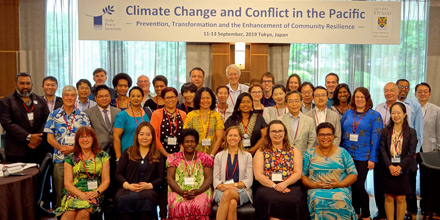Climate Change and Conflict in the Pacific: Prevention, Management and the Enhancement of Community Resilience
A Climate Change and Conflict workshop which brought together Japanese, Pacific, North
American and European scholars and policy makers was held in Tokyo from 11-13 September
2019. The workshop entitled Climate Change and Conflict in the Pacific: Prevention,
Management and the Enhancement of Community Resilience, was hosted by Toda Peace Institute
and the National Centre for Peace and Conflict Studies, University of Otago.

The workshop, which was a follow up to a successful event held in Auckland, New Zealand, in 2018, adopted a ‘triangular’ approach: the workshop heard first from international scholars who presented the ‘state of the art’ of research on climate change, conflict and security, then from Pacific Islanders who presented their local and regional research findings and their practice-based approaches, and finally from Japanese presenters who outlined the state of the debate in Japan.
Issues addressed included water, land and food security; conflict-sensitive adaptation; climate change-induced migration; the significance of traditional knowledge; and the cultural dimension of climate change adaptation and its significance within the climate change-security/conflict nexus.
The participants represented not only a broad geographic span, but also a range of viewpoints including academic, government policy, churches, NGOs, and Pacific community-based organisations.
A common theme which emerged was the need to identify ways of working in partnership with key players in order to address the worst impacts of climate change. This includes listening to people’s own ways of knowing and the need to have an environment conducive for communicating across cultures. Addressing the disconnect between the academic world, lived experiences and policy discourse was seen as central to bridging the communication gap.
With reference to this challenge, Director of Toda Peace Institute, Professor Kevin Clements, said “Communication has to happen in all directions. We have to build bridges not only between cultures, but also between the spheres of academic research and politics. In order for this dynamic to be useful, however, such connection must be aimed at higher levels of co-operation in the adaptation of vulnerable people to climate change. This is a central mission of the Toda Peace Institute.”
A Toda Policy Brief based on the discussions of the workshop will be published on the Toda website in January 2020. A full workshop report will then also be available.